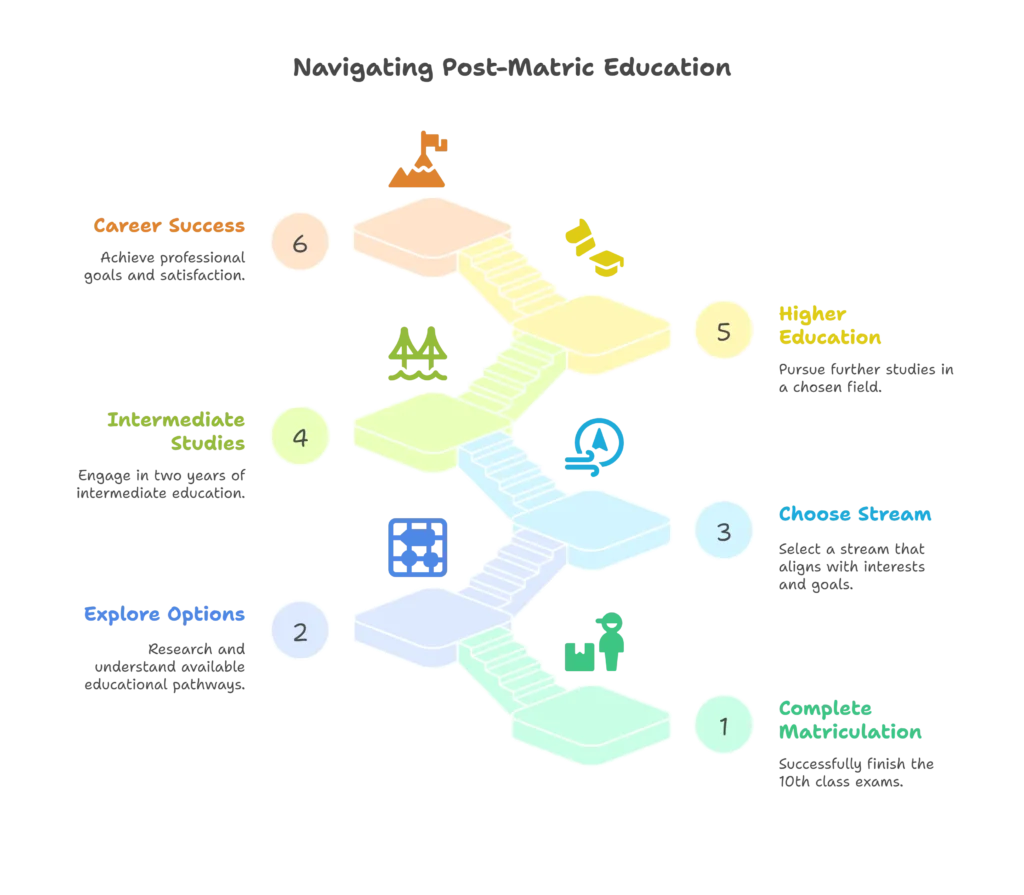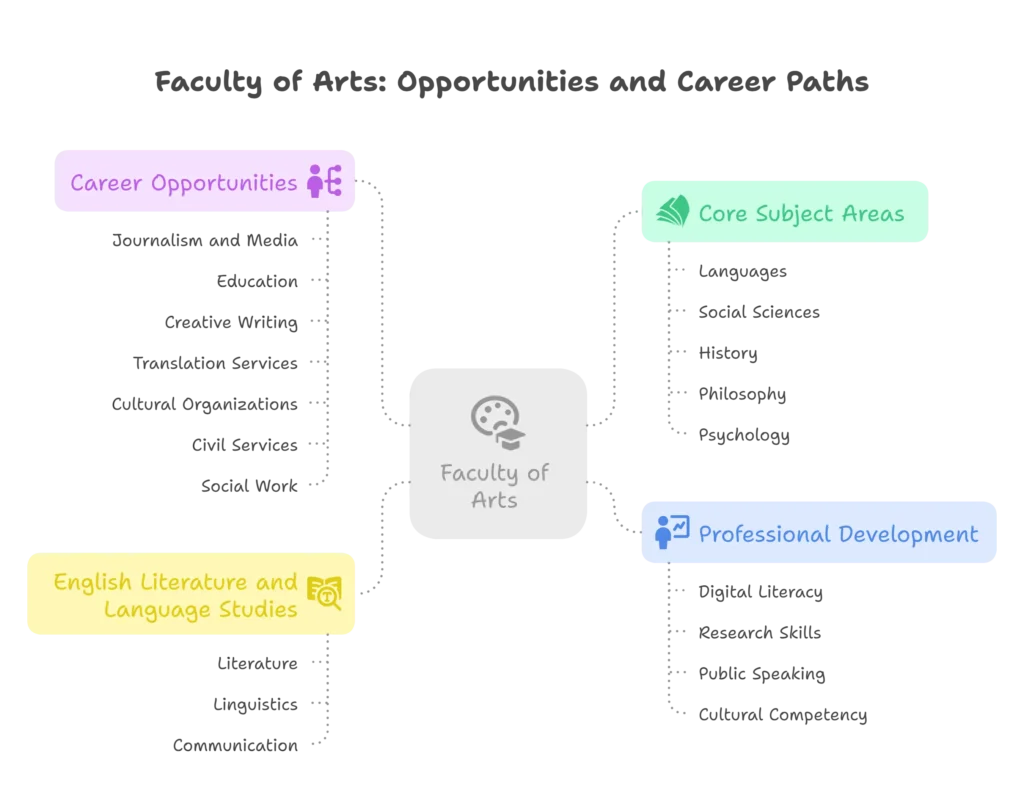In Pakistan, the matric system plays a crucial role in shaping students’ educational and professional journeys. It lays the foundation for higher studies and opens doors to various career opportunities. In this article, we will delve into the benefits of choosing the right field after matriculation and explore some popular study options available.

So if you’re a student who has recently completed their 10th class or someone seeking guidance on potential career paths for their child or loved one, read on! We have got you covered with valuable insights that will help you make an informed decision about your future endeavors. Let’s dive in!
| Field of Study | Description |
|---|---|
| FSc Pre-Medical | – Ideal for students interested in pursuing a career in medicine or healthcare. – Subjects: Biology, Chemistry, and Physics. – Opens opportunities for MBBS or BDS degrees and other medical-related fields. – Equips students with critical thinking and problem-solving skills. |
| FSc Pre-Engineering | – Suitable for students interested in engineering careers. – Subjects: Mathematics, Physics, and Chemistry. – Provides a foundation for various engineering disciplines. – Opens doors to top engineering universities. – Develops problem-solving and analytical skills. |
| A-Levels | – Focuses on humanities and arts subjects. – Opportunities in journathem, literature studies, and civil services. – Develop critical thinking and communication skills. |
| Diploma/Certificate Courses | – Short-term courses providing practical skills. – Options in graphic design, web development, culinary arts, and more. – Quick entry into the job market. – Recognized by employers in specific industries. |
| Intermediate in Faculty of Arts (FA) | – Focuses on humanities and arts subjects. – Opportunities in journalism, literature studies, and civil services. – Develops critical thinking and communication skills. |
| Intermediate in Computer Science (ICS) | – Centers around computer science subjects. – Career options in software engineering, web development, and IT fields. – Provides valuable technical skills for the digital age. |
| Intermediate in Commerce (ICOM) | – Includes commerce-related subjects like Accounting and Economics. – Opens paths in finance, banking, and entrepreneurship. – Provides practical skills for business management. |
| Pakistan Army | – Joining the Pakistan Army offers a rewarding career with a sense of patriotism. – Various paths, including officer training at PMA. – Opportunities to serve in different specialized corps. – Equips individuals with leadership and teamwork skills. |
| Pakistan Rangers | – Joining Pakistan Rangers contributes to national security and law enforcement. – Rigorous training in physical fitness, discipline, and combat tactics. – Provides a sense of pride in serving the country. – Stable employment with attractive benefits. – Opportunity to work with dedicated professionals. |
| Freelancing | – Freelancing offers flexibility and independence in work. – Diverse opportunities in graphic design, content writing, programming, and more. – Potential for higher earnings and career growth. – Requires discipline, self-motivation, and effective time management. |
An Insight into the Matric System
The matric system in Pakistan is an educational framework that sets the stage for students’ academic and professional journeys. It consists of a two-year program, usually completed after 10 years of schooling. The main objective of this system is to provide students with a solid foundation in various subjects.
During the matriculation period, students are exposed to a wide range of subjects including English, Mathematics, Science (Physics, Chemistry, Biology), Social Studies (Pakistan Studies and Islamic Studies), and elective courses such as Computer Science or Economics. This diverse curriculum helps students explore their interests and identify their strengths.
One key feature of the matric system is the examination process. At the end of each academic year, students must appear for board exams which are conducted by regional education boards across Pakistan. These exams play a vital role in determining students’ performance and eligibility for further studies.
The matric system offers two major pathways: science and arts. Students can choose between these streams based on their career aspirations and areas of interest. The science stream focuses on subjects like Physics, Chemistry, Biology, or Mathematics while the arts stream encompasses subjects like Urdu Literature, English Literature, History, or Geography.
The matric system plays a pivotal role in shaping students’ educational journey by providing them with a strong foundation in various subjects. It acts as a stepping stone towards higher studies and opens up numerous opportunities for future careers.
Choosing the Right Field After 10th Class
Choosing the right field after completing matriculation can have numerous benefits for students in Pakistan. It is a critical decision that can shape their entire academic and professional journey. By selecting a field that aligns with their interests, skills, and aptitude, students can increase their chances of success and fulfillment in their careers.
One of the main benefits of choosing the right field after matric is increased motivation and engagement in studies. When students are passionate about what they are learning, they are more likely to be motivated to excel academically. This passion can also lead to better understanding and retention of knowledge, as well as improved performance in exams.
Another advantage is that selecting the right field allows students to explore career opportunities that match their strengths. By focusing on subjects or fields they enjoy and excel at, they can build a solid foundation for future specialization or further education. This not only enhances employability but also opens doors to higher education options such as universities or technical institutes.
Furthermore, choosing the right field after matriculation enables students to gain practical skills relevant to their chosen industry early on. Whether it’s through specialized courses or vocational training programs, these practical skills provide a competitive edge when entering the job market upon completion of studies.
Making an informed decision about one’s career path after matriculation helps minimize wasted time and resources by avoiding pursuing fields that may not align with personal interests or long-term goals. It allows individuals to focus on developing expertise in areas where they have genuine interest and potential for growth.
Choosing the right field after matric has numerous advantages including increased motivation, exploration of suitable career paths matching individual strengths, acquisition of practical skills relevant to chosen industries early on, and effective utilization of time and resources towards personal growth.
Study and Career Options After Matric in Pakistan
FSc Pre-Medical: Gateway to Healthcare Careers

FSc Pre-Medical remains one of the most competitive and sought-after options for students with strong science backgrounds. This two-year program focuses intensively on Biology, Chemistry, and Physics, preparing students for careers in healthcare and medical sciences.
Core Subjects and Curriculum:
- Biology: Comprehensive study of living organisms, genetics, and human anatomy
- Chemistry: Organic, inorganic, and biochemistry fundamentals
- Physics: Applied physics relevant to medical sciences
- Mathematics: Basic mathematical concepts supporting scientific understanding
- English and Urdu: Communication skills essential for patient interaction
Career Opportunities: The Pre-Medical pathway opens doors to numerous prestigious careers:
- MBBS (Bachelor of Medicine and Surgery): Becoming a qualified doctor
- BDS (Bachelor of Dental Surgery): Specializing in dental care
- Pharmacy: Pharmaceutical sciences and drug development
- Nursing: Professional healthcare support and patient care
- Medical Laboratory Technology: Diagnostic and laboratory sciences
- Physiotherapy: Rehabilitation and physical therapy
- Veterinary Sciences: Animal healthcare and treatment
Students interested in animal healthcare should particularly consider the veterinary field, as it offers excellent career prospects. For detailed information about veterinary education and career paths, explore comprehensive resources about DVM programs and career opportunities.
The medical field also offers specialized technical roles that are increasingly in demand. Medical Laboratory Technology has emerged as a critical healthcare profession, combining scientific knowledge with practical diagnostic skills. Students can learn more about MLT career prospects and educational requirements to understand this growing field better.
Admission Requirements:
- Minimum 60% marks in matriculation (varies by institution)
- Strong performance in science subjects
- MDCAT (Medical and Dental College Admission Test) qualification
- Physical and mental fitness requirements
FSc Pre-Engineering: Foundation for Technical Innovation

Pre-Engineering attracts students passionate about mathematics, physics, and problem-solving. This pathway focuses on developing analytical thinking and technical skills essential for engineering disciplines.
Core Subject Areas:
- Mathematics: Advanced calculus, algebra, and applied mathematics
- Physics: Mechanics, thermodynamics, and modern physics concepts
- Chemistry: Chemical processes and material science basics
- Computer Science: Programming fundamentals and logical thinking
- English: Technical communication and documentation skills
Engineering Disciplines Available: After completing Pre-Engineering, students can pursue various engineering specializations:
- Computer Science Engineering: Software development, AI, and cybersecurity
- Electrical Engineering: Power systems, electronics, and telecommunications
- Mechanical Engineering: Manufacturing, automotive, and industrial systems
- Civil Engineering: Construction, infrastructure, and urban planning
- Chemical Engineering: Process industries and material development
- Biomedical Engineering: Medical device development and healthcare technology
- Aerospace Engineering: Aviation and space technology
- Environmental Engineering: Sustainable development and pollution control
Career Prospects: Engineering graduates enjoy diverse career opportunities in both public and private sectors. From multinational corporations to government departments, skilled engineers are always in demand. The digital transformation across industries has particularly increased demand for computer science and electrical engineering professionals.
Industry Growth Areas:
- Information Technology and Software Development
- Renewable Energy and Green Technology
- Telecommunications and 5G Infrastructure
- Manufacturing and Industrial Automation
- Construction and Smart City Development
Advanced Level (A-Levels): International Recognition and Flexibility

A-Levels provide an internationally recognized qualification that offers maximum flexibility in subject selection. Students can choose from a wide range of subjects across sciences, humanities, and social sciences.
Key Advantages:
- Global Recognition: Accepted by universities worldwide
- Subject Flexibility: Choose subjects aligned with career goals
- Critical Thinking Development: Emphasis on analytical and research skills
- University Preparation: Strong foundation for higher education
- Scholarship Opportunities: Access to international scholarship programs
Popular Subject Combinations:
- Sciences: Physics, Chemistry, Biology, Mathematics
- Business: Economics, Business Studies, Accounting, Mathematics
- Humanities: English Literature, History, Psychology, Sociology
- Mixed Combinations: Tailored to specific career requirements
Students pursuing A-Levels often have clearer paths to international education opportunities and can apply directly to foreign universities. The program’s flexibility allows students to explore interdisciplinary interests while maintaining academic rigor.
Arts and Humanities Pathways
Intermediate in Faculty of Arts (FA): Exploring Human Expression and Culture
The Faculty of Arts offers rich opportunities for students interested in languages, literature, history, and social sciences. This pathway develops critical thinking, communication skills, and cultural understanding.
Core Subject Areas:
- Languages: Urdu, English, Arabic, Persian literature studies
- Social Sciences: Pakistan Studies, Islamic Studies, Sociology
- History: World history, Islamic history, and regional studies
- Philosophy: Logic, ethics, and philosophical thinking
- Psychology: Human behavior and mental processes
Career Opportunities in Arts: Contrary to common misconceptions, arts graduates have diverse career prospects:
- Journalism and Media: Print, electronic, and digital media careers
- Education: Teaching at various educational levels
- Creative Writing: Content creation, copywriting, and publishing
- Translation Services: Language services for businesses and organizations
- Cultural Organizations: Museums, libraries, and heritage institutions
- Civil Services: CSS and other competitive examinations
- Social Work: Community development and NGO sector
English Literature and Language Studies: Students with strong English language skills can pursue specialized careers in literature, linguistics, and communication. The field offers excellent opportunities for those passionate about language and literature. Detailed information about MA English programs and career prospects can help students understand advanced study options in this field.
Professional Development: Arts students should focus on developing complementary skills:
- Digital Literacy: Understanding online platforms and digital communication
- Research Skills: Data collection, analysis, and presentation
- Public Speaking: Confidence in communication and presentation
- Cultural Competency: Understanding diverse perspectives and contexts
Commerce and Business Education
Intermediate in Commerce (ICOM): Business Foundations and Entrepreneurship
Commerce education provides essential business knowledge and prepares students for careers in finance, management, and entrepreneurship. The curriculum combines theoretical knowledge with practical business applications.
Essential Subject Components:
- Accounting: Financial record-keeping, auditing, and taxation
- Economics: Microeconomics, macroeconomics, and market analysis
- Business Studies: Management principles, marketing, and operations
- Mathematics: Business mathematics and statistical analysis
- Banking: Financial institutions and monetary systems
Career Pathways in Commerce:
- Banking and Finance: Commercial banking, investment banking, insurance
- Accounting and Auditing: Chartered Accountancy, financial consulting
- Business Management: Operations, human resources, marketing
- Entrepreneurship: Starting and managing personal businesses
- Government Services: Revenue, taxation, and economic departments
- International Trade: Import/export businesses and logistics
Professional Certifications: Commerce students can enhance their marketability through professional certifications:
- ACCA (Association of Chartered Certified Accountants)
- CA (Chartered Accountancy)
- CMA (Cost and Management Accounting)
- Banking Diplomas from IBP (Institute of Bankers Pakistan)
Business Skills Development: Successful commerce students should focus on:
- Analytical Thinking: Problem-solving and data interpretation
- Communication: Business correspondence and presentation skills
- Technology: Business software and digital platforms
- Leadership: Team management and decision-making capabilities
Technology and Computer Science Pathways
Intermediate in Computer Science (ICS): Digital Age Preparation
Computer Science has become increasingly vital in today’s digital economy. ICS provides foundational knowledge in programming, systems analysis, and information technology.
Technical Curriculum:
- Programming Languages: C++, Java, Python, and web development
- Database Management: Data storage, retrieval, and analysis
- Computer Networks: Internet technologies and cybersecurity
- Software Engineering: Application development and system design
- Mathematics: Discrete mathematics and computational logic
Technology Career Opportunities: The IT sector offers numerous high-growth career paths:
- Software Development: Mobile apps, web applications, enterprise software
- Cybersecurity: Information security, ethical hacking, risk management
- Data Science: Big data analytics, machine learning, artificial intelligence
- Network Administration: IT infrastructure and system management
- Digital Marketing: Online marketing, SEO, social media management
- Game Development: Interactive entertainment and educational games
- Cloud Computing: Distributed systems and remote infrastructure
Industry Certifications: Students can pursue industry-recognized certifications:
- Microsoft Certified Solutions Associate (MCSA)
- Cisco Certified Network Associate (CCNA)
- Oracle Database Certification
- Google Cloud Platform Certification
- CompTIA Security+ for Cybersecurity
Freelancing and Remote Work: Computer Science graduates have excellent opportunities for remote work and freelancing. The global demand for IT services allows Pakistani professionals to work with international clients, often earning competitive rates in foreign currencies.
Professional and Technical Training Options
Diploma and Certificate Programs: Fast-Track to Employment
Short-term diploma and certificate programs offer practical skills training for immediate employment. These programs typically last 6 months to 2 years and focus on industry-specific competencies.
Popular Technical Programs:
- Graphic Design: Visual communication, branding, and digital media
- Web Development: Front-end and back-end programming
- Digital Marketing: Online advertising, content marketing, analytics
- Culinary Arts: Professional cooking and hospitality management
- Fashion Design: Clothing design, textile knowledge, fashion business
- Photography: Professional photography, photo editing, commercial work
- Interior Design: Space planning, decoration, and architectural visualization
Advantages of Diploma Programs:
- Quick Employment: Faster entry into the job market
- Practical Skills: Hands-on training with industry equipment
- Lower Costs: More affordable than traditional degree programs
- Industry Connections: Direct links to potential employers
- Flexible Scheduling: Part-time and evening options available
Professional Development: Diploma holders should continue learning through:
- Online Courses: Skill enhancement through digital platforms
- Industry Workshops: Staying updated with latest trends
- Certification Programs: Adding credentials to professional profile
- Networking Events: Building professional relationships
Alternative Career Paths After Matriculation
Pakistan Armed Forces: Service to Nation
Military service offers unique opportunities for personal development, leadership training, and national service. The Pakistan Armed Forces provide structured career progression and comprehensive benefits.
Pakistan Army Opportunities:
- Pakistan Military Academy (PMA): Officer training and commission
- Technical Cadet Course: Specialized technical roles
- Direct Commission: For graduates in specific fields
- Soldier Recruitment: Various ranks and specializations
Training and Development: Military service provides:
- Leadership Skills: Command and management experience
- Discipline: Structured approach to life and work
- Technical Training: Specialized military and civilian-applicable skills
- Physical Fitness: Comprehensive health and fitness programs
- Educational Benefits: Continued learning and degree completion support
Pakistan Rangers: Paramilitary Service Rangers offer similar benefits to army service with focus on:
- Border Security: Protecting national boundaries
- Law Enforcement: Maintaining internal security
- Counter-terrorism: Specialized security operations
- Community Service: Disaster relief and public assistance
Career Benefits:
- Job Security: Stable, long-term employment
- Healthcare: Comprehensive medical benefits
- Housing: Accommodation facilities for families
- Education: Children’s education support and scholarships
- Retirement: Pension and post-service employment assistance
Legal Education and Career Paths
The legal profession offers excellent opportunities for students interested in justice, advocacy, and legal services. Legal education opens doors to diverse career paths in Pakistan’s growing legal sector.
Law Degree Options:
- LLB (Bachelor of Laws): Traditional 3-year law degree after graduation
- 5-Year Integrated LLB: Direct entry after matriculation
- Specialized Legal Studies: Corporate law, criminal law, family law
Students interested in legal careers can find comprehensive information about LLB programs, admission requirements, and career prospects to make informed decisions about legal education.
Legal Career Opportunities:
- Private Practice: Independent law practice and client representation
- Corporate Legal: In-house counsel for businesses and organizations
- Government Legal Services: Public prosecutor, legal advisor roles
- Judicial Services: Judge, magistrate, and court administration
- Legal Consulting: Specialized legal advisory services
- Human Rights: NGOs and advocacy organizations
Freelancing and Digital Entrepreneurship
The digital economy has created unprecedented opportunities for independent work and entrepreneurship. Freelancing allows students to develop marketable skills and earn income while pursuing education.
Popular Freelancing Areas:
- Content Writing: Blog posts, articles, copywriting
- Graphic Design: Logos, marketing materials, digital art
- Web Development: Website creation and maintenance
- Digital Marketing: Social media management, SEO services
- Translation Services: Language conversion and localization
- Virtual Assistance: Administrative support for businesses
- Online Tutoring: Educational services and skill training
Building Freelance Success:
- Skill Development: Continuously improving professional abilities
- Portfolio Building: Showcasing work quality and capabilities
- Client Relations: Maintaining professional communication
- Time Management: Balancing multiple projects and deadlines
- Financial Planning: Managing irregular income and business expenses
Platform Utilization: Pakistani freelancers can access global markets through:
- Upwork: Comprehensive freelancing platform
- Fiverr: Service-based marketplace
- Freelancer.com: Project-based work opportunities
- Guru: Professional services platform
- Local Platforms: Pakistani freelancing websites
Financial Considerations and Planning
Cost Analysis of Different Pathways
Understanding the financial implications of educational choices helps families plan effectively for their children’s futures.
Traditional Academic Routes:
- FSc Programs: PKR 15,000-50,000 annually (government vs. private institutions)
- A-Levels: PKR 80,000-300,000 annually (varies by institution quality)
- Diploma Programs: PKR 20,000-100,000 total program cost
Professional Education:
- Medical Education: PKR 200,000-2,000,000 annually (government vs. private medical colleges)
- Engineering Programs: PKR 100,000-800,000 annually
- Law Education: PKR 50,000-300,000 annually
Financial Planning Strategies:
- Scholarship Research: Merit and need-based financial assistance
- Educational Loans: Bank financing options for higher education
- Part-time Work: Earning while studying through appropriate jobs
- Family Planning: Long-term financial preparation for education costs
- Government Programs: Public sector educational support initiatives
Return on Investment Analysis
Different educational pathways offer varying financial returns and career stability:
High ROI Fields:
- Medical Professions: Strong earning potential and job security
- Engineering: Growing demand and competitive salaries
- IT and Computer Science: Rapid growth and international opportunities
- Business and Finance: Diverse career options and advancement potential
Factors Affecting Career Success:
- Market Demand: Industry growth and job availability
- Skill Development: Continuous learning and professional growth
- Geographic Mobility: Willingness to relocate for opportunities
- Networking: Professional relationships and mentorship
- Entrepreneurial Spirit: Innovation and business development capabilities
Modern Trends and Future Opportunities
Emerging Fields and Career Prospects
Pakistan’s evolving economy creates new opportunities across various sectors:
Technology Integration:
- Artificial Intelligence: Machine learning and automation
- Blockchain Technology: Cryptocurrency and digital transactions
- Internet of Things (IoT): Connected devices and smart systems
- Renewable Energy: Solar, wind, and sustainable technology
- Biotechnology: Medical research and pharmaceutical development
Service Sector Growth:
- E-commerce: Online retail and digital marketplaces
- Digital Banking: Fintech and financial services innovation
- Tourism and Hospitality: Cultural and adventure tourism
- Healthcare Services: Private healthcare and specialized treatments
- Education Technology: Online learning and educational software
Skills for Future Success:
- Digital Literacy: Comfort with technology and digital platforms
- Critical Thinking: Analysis and problem-solving abilities
- Communication: Multilingual and cross-cultural competencies
- Adaptability: Flexibility in changing work environments
- Emotional Intelligence: Interpersonal skills and empathy
Global Connectivity and Remote Work
Pakistani professionals increasingly access international opportunities through remote work and digital services:
International Market Access:
- Freelancing Platforms: Global client base and foreign currency earnings
- Remote Employment: Working for international companies from Pakistan
- Digital Nomadism: Location-independent career options
- Cross-border Education: Online degrees and international certifications
Preparation for Global Competition:
- English Proficiency: International communication standards
- Cultural Awareness: Understanding global business practices
- Time Zone Management: Working across different geographical regions
- Quality Standards: Meeting international service expectations
Decision-Making Framework for Students
Self-Assessment and Career Alignment
Choosing the right path requires honest self-evaluation and understanding of personal strengths, interests, and goals.
Key Assessment Areas:
- Academic Strengths: Subjects where you naturally excel
- Personal Interests: Activities that genuinely engage and motivate you
- Career Values: What matters most in your professional life
- Work Environment Preferences: Settings where you feel most productive
- Long-term Goals: Where you see yourself in 10-15 years
Assessment Tools and Resources:
- Career Counseling: Professional guidance from educational institutions
- Aptitude Tests: Standardized assessments of abilities and interests
- Informational Interviews: Conversations with professionals in target fields
- Job Shadowing: Observing professionals in their work environments
- Trial Experiences: Internships, volunteering, or part-time work
Family and Social Considerations
Educational and career decisions in Pakistan often involve family input and social expectations:
Balancing Perspectives:
- Personal Passion: Following genuine interests and aptitudes
- Family Expectations: Respecting family wisdom and concerns
- Social Pressures: Managing community expectations appropriately
- Economic Realities: Considering financial constraints and opportunities
- Cultural Values: Aligning with cultural and religious principles
Communication Strategies:
- Open Dialogue: Honest conversations about goals and concerns
- Information Sharing: Educating family about career prospects
- Compromise Solutions: Finding paths that satisfy multiple stakeholders
- Gradual Persuasion: Building support through demonstrated success
- Professional Mediation: Involving counselors when needed
Conclusion: Charting Your Path Forward
The journey after completing 10th class in Pakistan offers remarkable diversity and opportunity. Whether you choose traditional academic routes through FSc Pre-Medical or Pre-Engineering, explore international options like A-Levels, pursue technical skills through diploma programs, or consider alternative paths like military service or freelancing, success depends on alignment between your choices and your authentic interests and capabilities.
The key to making the right decision lies in thorough research, honest self-assessment, and understanding the changing dynamics of Pakistan’s economy and global connectivity. Don’t let traditional thinking limit your exploration of emerging fields and innovative career paths.
Remember that your initial choice after matriculation isn’t necessarily permanent. Many successful professionals have changed directions, acquired additional skills, or discovered new passions throughout their careers. What matters most is taking that first step with confidence, commitment, and openness to learning and growth.
Pakistan’s young generation has unprecedented access to information, technology, and global opportunities. By making informed decisions, developing relevant skills, and maintaining adaptability, you can build a fulfilling career that contributes to both personal success and national development.
Take time to explore your options thoroughly, seek guidance from experienced professionals, and trust in your ability to create a meaningful and prosperous future. The path you choose after 10th class is just the beginning of a lifelong journey of learning, growth, and contribution to society.
Your future awaits – make it count.
FAQs
Q: What are the career options after completing the 10th class in Pakistan?
A: After completing the 10th class in Pakistan, you have a wide range of study and career options to choose from. Some popular choices include pursuing FSc Pre-Medical or Pre-Engineering, opting for A Levels, enrolling in diploma or certificate courses, or exploring other intermediate programs like FSc, FA, ICS, or ICOM.
Q: Which field is better after matriculation?
A: The best field depends on your individual interests, strengths, and career goals. Science fields like Pre-Medical and Pre-Engineering offer strong career prospects, while commerce and arts provide diverse opportunities. Consider your academic performance, personal interests, and long-term aspirations when making this decision.
Q: Can I pursue arts subjects after matriculation?
A: Yes! After matriculation in Pakistan, you can opt for an intermediate program in the Faculty of Arts (FA). This allows you to explore various art subjects like literature, languages (Urdu/English), history, sociology, etc., opening up opportunities in fields such as journalism, teaching, content writing, etc.
Q: Is it necessary to enroll in college after completing the 10th class?
A: While it is not mandatory to enroll directly into college after completing the 10th class (matric), further education does enhance your knowledge base and improve job prospects. Pursuing higher education helps develop critical thinking skills and provides specialized knowledge within specific domains of study.
Q: Are there any alternative career paths apart from traditional studies after matriculation?
A: Absolutely! Apart from traditional academic paths like FSc or A Levels post-matriculation studies; there are alternative routes to consider. For instance, you can explore career opportunities in the Pakistan Army or Freelancing.
Q: Can I switch fields after completing my matriculation?
A: Yes, you can switch fields even after completing matriculation. There are various options available such as changing your intermediate program or pursuing diploma/certificate courses in a different area.
Q: How do I know if I’m making the right choice for my future?
A: Perfect certainty isn’t always possible, but thorough research, self-assessment, and seeking advice from professionals in your fields of interest can help. Remember that career paths can evolve, and continuous learning allows for adjustments along the way.
Q: What are the prospects for studying abroad after intermediate?
A: A-Levels provide the best pathway for international education, but FSc graduates can also apply to foreign universities. Research specific country requirements, prepare for standardized tests like SAT or IELTS, and explore scholarship opportunities early.


0 Comments